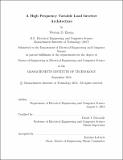A high frequency variable load inverter architecture
Author(s)
Braun, Weston D.
Download1098053529-MIT.pdf (5.054Mb)
Other Contributors
Massachusetts Institute of Technology. Department of Electrical Engineering and Computer Science.
Advisor
David J. Perreault.
Terms of use
Metadata
Show full item recordAbstract
This thesis presents a high frequency variable load inverter architecture along with a physical prototype and eciency optimizing controller. The inverter architecture consists of two constituent inverters, one connected directly through the load and the other connected through an immittance converter, which acts as a lossless power combiner. By controlling the amplitude and relative phase of the two constituent inverters the loading seen by each constituent inverter can be kept in a desirable range for wide variations in load impedance. This allows for the use of highly ecient zero voltage switching inverters that would otherwise be precluded in applications with widely varying load impedances, such as wireless power transfer and plasma generation. Previous solutions to the challenge of driving widely variable load impedances, such as the tunable matching network, have typically resulted in systems that are often bulky, expensive, and slow. The physical prototype developed for this project operates at 13.56MHz and can supply a maximum output power of 1kW into a 21:8 + 0:3j load at an eciency of 95:4%. The eciency optimizing controller utilizes a quasi-static model prediction approach which allows for optimization of system performance over any desirable parameter. The system is also capable of driving a wide range of capacitive and inductive loads at a high power level and with high efficiency.
Description
This electronic version was submitted by the student author. The certified thesis is available in the Institute Archives and Special Collections. Thesis: M. Eng., Massachusetts Institute of Technology, Department of Electrical Engineering and Computer Science, 2018 Cataloged from student-submitted PDF version of thesis. Includes bibliographical references (pages 163-165).
Date issued
2018Department
Massachusetts Institute of Technology. Department of Electrical Engineering and Computer SciencePublisher
Massachusetts Institute of Technology
Keywords
Electrical Engineering and Computer Science.